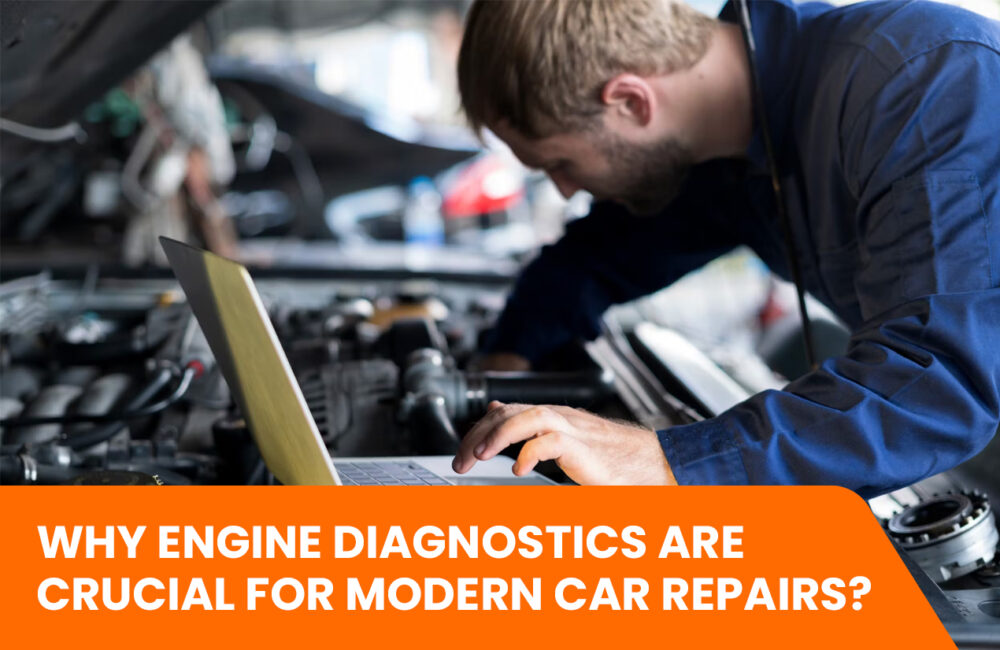Modern cars are equipped with more advanced technology than ever before. From smart sensors to computerized systems, today’s vehicles rely heavily on electronic components to monitor performance and ensure safety. In this high-tech environment, engine diagnostics have become not just useful but absolutely essential. If your car is showing signs of trouble, accurate diagnostics are often the first and most important step to efficient, effective repair.
Let’s explore why engine diagnostics are so crucial in modern car repairs, and how they help mechanics and car owners save time, money, and stress.
Understanding Engine Diagnostics
Engine diagnostics refer to the process of using specialized tools to communicate with your vehicle’s onboard computer systems. These systems constantly monitor engine performance, emissions, fuel usage, and many other critical factors.
When something goes wrong such as a misfire, poor fuel economy, or overheating the car’s sensors detect the issue and store a corresponding error code. Mechanics use diagnostic tools (like OBD-II scanners) to read these codes, which help pinpoint what’s malfunctioning and where.
This process allows technicians to quickly assess a wide range of issues without having to disassemble large parts of the vehicle or guess based on symptoms alone.
Quick and Accurate Problem Detection
One of the biggest advantages of engine diagnostics is the speed and precision it offers in identifying problems. Rather than relying solely on physical inspections or trial-and-error methods, a diagnostic scan can immediately detect issues related to:
- Ignition systems
- Fuel injectors
- Emission control systems
- Oxygen sensors
- Transmission controls
- Temperature sensors
For example, if your “check engine” light turns on, the diagnostic system can reveal whether it’s a minor sensor glitch or a major engine failure. This helps ensure that the problem is addressed correctly from the beginning.
Reduces Unnecessary Repairs
Before the rise of diagnostic technology, car mechanics often had to rely on their experience and intuition to fix problems. While many were skilled, this approach sometimes led to misdiagnoses and unnecessary repairs.
With engine diagnostics, you get a clear picture of the actual issue. This prevents you from paying for parts or services that weren’t needed, reducing costs and ensuring only the required repair is performed. For the car owner, this transparency builds trust in the service provider and gives confidence that repairs are justified.
Improves Safety and Reliability
Modern cars use a network of sensors to monitor components that directly affect driver safety, such as brakes, steering, airbags, and stability control. Engine diagnostics allow these safety-critical systems to be monitored effectively and reveal hidden problems before they become dangerous.
For example, a failing ABS sensor or a malfunctioning throttle control can put you at serious risk, but may not be obvious until it’s too late. Diagnostics help catch these issues early, giving mechanics the chance to repair them before they lead to accidents or breakdowns.
Supports Preventive Maintenance
Engine diagnostics aren’t just useful when something breaks they’re also an essential tool for preventive maintenance. Regular diagnostic scans can reveal small issues before they evolve into larger, more expensive problems.
Things like slow-developing leaks, clogged fuel injectors, or gradual sensor failure can be identified during routine servicing. This allows car owners to act early and avoid the frustration of being stranded on the road or hit with surprise repair bills.
Think of diagnostics as a health check-up for your car. Just as regular medical tests help humans catch health issues early, diagnostics do the same for vehicles.
Essential for Hybrid and Electric Vehicles
With the increasing popularity of hybrid and electric vehicles, engine diagnostics are more important than ever. These advanced vehicles rely heavily on software, battery management systems, and electric motors, all of which require specialized knowledge and tools to assess.
Traditional mechanical inspections simply don’t apply to many EV-related components. Diagnostics are the only way to read the system status, identify faults, and ensure smooth operation.
Mechanics who work on hybrid and electric cars must have up-to-date diagnostic tools and training to deal with the complexity of these vehicles safely and efficiently.
Faster Turnaround Times for Repairs
Time is valuable for both customers and auto repair shops. The faster a car is correctly diagnosed and repaired, the better it is for everyone involved.
Engine diagnostics speed up the entire repair process. Instead of spending hours troubleshooting, a mechanic can plug in a scanner, read the error codes, and know immediately where to focus their attention. This enables quicker service and reduces wait times, particularly helpful in busy workshops or for customers relying on their vehicles for daily use.
Saves Money in the Long Run
While a diagnostic test may seem like an additional expense at first, it often saves you money over time. By catching issues early and preventing incorrect or unnecessary repairs, engine diagnostics help you avoid more severe damage that would be costlier to fix later.
Additionally, better-maintained vehicles typically have a longer lifespan, better resale value, and improved fuel efficiency all of which save money in the long run.
Provides Clear Communication Between Mechanics and Customers
One often-overlooked benefit of engine diagnostics is how it improves communication between car repair shops and customers. The error codes and reports generated from diagnostic tools provide an objective explanation of what’s wrong, helping customers understand what needs to be fixed and why.
This transparency reduces misunderstandings and helps build trust. Car owners are more likely to approve necessary repairs when they know the problem has been precisely identified with clear data to support it.
Conclusion
In today’s world of technologically advanced vehicles, engine diagnostics are no longer optional they’re a necessity. From quick problem detection and cost savings to preventive care and increased safety, diagnostics are the foundation of modern car repairs.
Next time your “check engine” light comes on or you schedule routine maintenance, make sure your technician includes a thorough diagnostic scan. It could be the smartest decision you make for your car’s health and your peace of mind.


